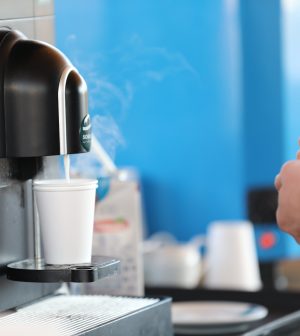- Could Your Grocery Store Meat Be Causing Recurring UTIs?
- Are You Making This Expensive Thermostat Error This Winter?
- Recognizing the Signs of Hypothyroidism
- 10 Strategies to Overcome Insomnia
- Could Artificial Sweeteners Be Aging the Brain Faster?
- Techniques for Soothing Your Nervous System
- Does the Water in Your House Smell Funny? Here’s Why
- Can a Daily Dose of Apple Cider Vinegar Actually Aid Weight Loss?
- 6 Health Beverages That Can Actually Spike Your Blood Sugar
- Treatment Options for Social Anxiety Disorder
Hospital Coffee Machines Aren’t Germ-Spreaders, Study Finds

Hospital coffee machines have received some side-eye as a potential source of spreading infection, but a new study debunks the belief.
“To our great relief…a general ban on coffee makers doesn’t seem necessary,” concluded researchers led by Dr. Sarah Victoria Walker, head of the Institute for Clinical Microbiology and Hospital Hygiene in Ludwigsburg, Germany.
For their study, German researchers swabbed 25 automatic capsule coffee makers and espresso machines.
Of the machines, 17 were from break rooms and offices in a university hospital in Cologne, Germany, and the other eight were in the homes of staff members. All of the coffee makers had been in use for at least a year.
Researchers swabbed them in five specific places – the drip tray, the outlet, the buttons, the handle of the water tank and the inside of the water tank.
The researchers focused on what the World Health Organization calls its high-priority ESKAPE pathogens — Enterococcus faecium, Staphylococcus aureus, Klebsiella pneumoniae, Acinetobacter baumannii, Pseudomonas aeruginosa, and Enterobacter species.
Those bacteria all pose an increasing threat because they are antibiotic-resistant and can lead to fatal blood infections in a hospital setting.
Unsurprisingly, bacterial growth was detected on every coffee machine.
What’s more, hospital machines were about three times as heavily colonized with microbes as home machines, with 360 strains isolated from 72 swabs compared to 135 strains from 34 swabs.
However, most of the detected species were bacteria that live on the skin or in the gut and pose no threat to health.
Only one disease-causing bacteria, S. aureus, was detected — once on the buttons of a home coffee maker and once on the inside of a water tank at the hospital, researchers noted.
The locations where staph was found suggest that user’s hands can touch unlikely parts of the machines, the researchers said.
The new study was published Dec. 18 in the BMJ.
Given the findings, coffee makers in hospital settings should be considered safe, the researchers concluded.
“Our thoughts now turn to tea-drinking nations,” they added. “Are teapots, kettles and hot water spouts similar breeding grounds for bacteria? Are the high temperatures in the pots sufficient to kill all potential pathogens? And what about the handles?”
More information
The World Health Organization has more about antimicrobial resistance.
SOURCE: BMJ, news release, Dec. 18, 2023
Source: HealthDay
Copyright © 2026 HealthDay. All rights reserved.










